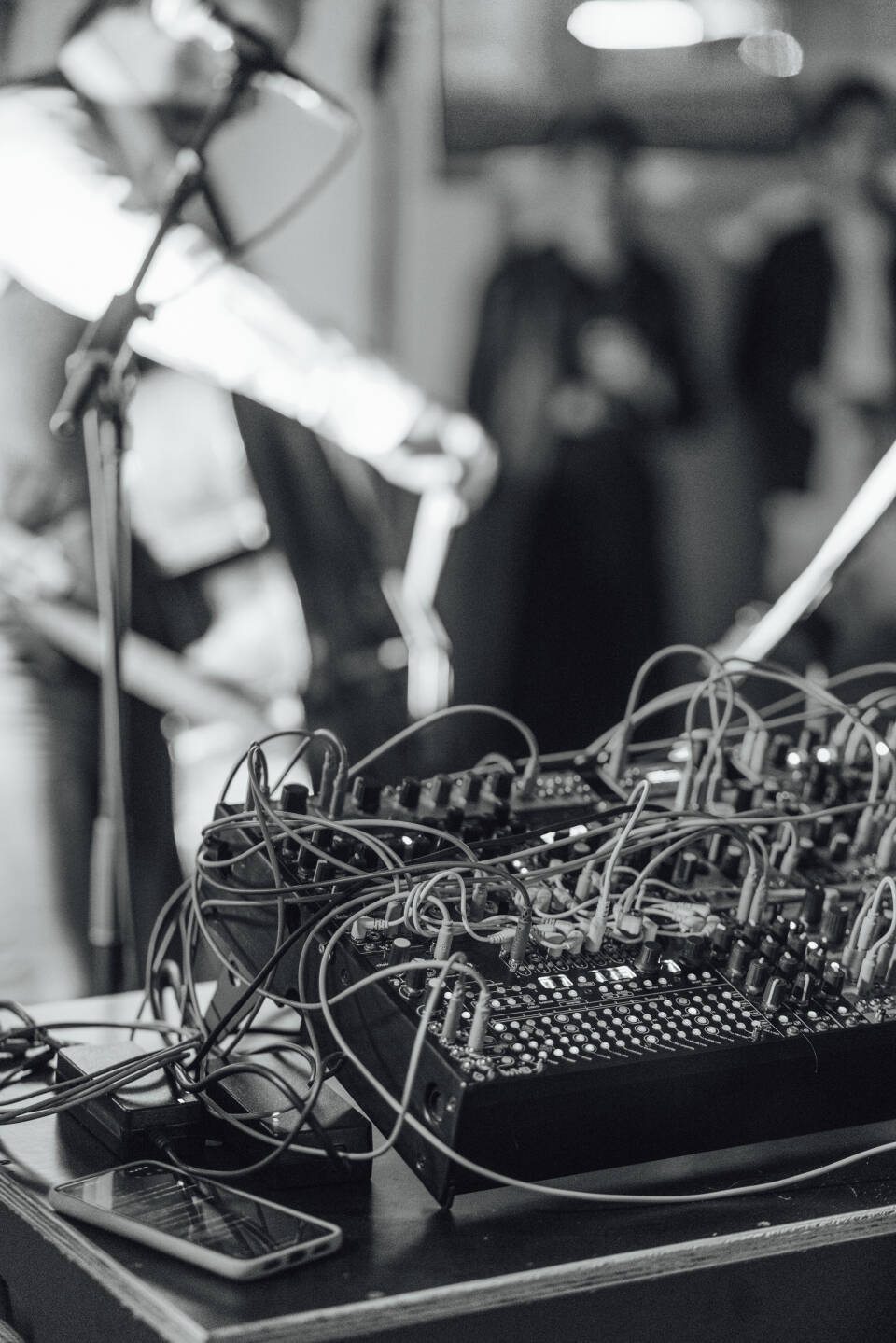pictures by Renaat Nijs & Jelmer Vervoort
ORPHEUS
Experience the electrifying fusion of classical mastery and modern metamorphosis as Benjamin Glorieux's thrilling cello harmonizes with Osaka Riot's cutting-edge modular synths in a groundbreaking night club show.
Although our project is sonorous proof of the search for how classical music and modular synths can coexist, they remain incompatible. Just as we can look back on past experiences with longing, any attempt to revive those moments is as doomed as Orpheus' attempt to resurrect his Eurydice.
Ann Wroe, author of "Orpheus: The Song of Life" (2011) says Orpheus' fatal gaze "symbolizes the way in which the artist, when suddenly inspired, when he sees beauty, when something really appeals to him, loses it when he tries to grasp it."
Our attempts to create one world out of these two extremes always prove inadequate, and that is where beauty lies for the taking.
Osaka Riot is the latest project of Ewout Decraene, a Belgian musician who has been part of more traditional formations within the national pop-and rock circuit, such as Rhinos Are People too (Studio Brussel Nieuwe Lichting Laureate) and Denali Wrench (Theater Aan Zee Laureate) before diving into his first solo project under the Japan-esque name. Osaka Riot aims to reclaim the ephemeral character of early electronic music while at the same time upholding a more contemporary expectation of the genre as dance music. He does so by improvising music on modular synthesizers in a context that would traditionally be reserved for DJ’s - thereby offering a new perspective on a format that is typically built on remixing pre-existing and inherently non-live music.
The instrument of choice, a modular synthesizer, is a conscious choice within the outset of the project. In simple terms, it is a system that one can build out of discrete components and electric circuitry in order to create an instrument tailored to the needs of the artist. In the case of Osaka Riot, the specific goal of the synthesizer was to create a system that is instable by design and therefore unable to easily recreate certain sounds or textures. This, in combination with the fact that live sets by Osaka Riot exist solely out of improvisation for all aspects of the music, allows for an approach that at first would seem out of place within a club or similarly dance-focused setting. The result is a unique (in the sense that it can never be repeated) exploration where both the artist and audience, through various feedbackloops, delve into the question of what constitutes dance music – and how far the notion can be stretched before it is no longer perceived as such.
Osaka Riot is active within the live circuit and has performed for both established as more grass-roots organizations such as Ancienne Belgique, Muziekodroom, Absolutely Free Festival, Zwart Goud Festival, Forty Five, Warrecords, Farrm and more. Additionally, he was finalist of Soundtrack, a Flemish/Brussels competition for musical projects.
Benjamin Glorieux navigates through various musical domains, from authentic historical to experimental contemporary.
A cellist, composer, and conductor, Benjamin was born in Kortrijk and currently resides in the Flemish Ardennes.
In addition to his performances and projects as a soloist, Benjamin continuously forges new connections with musicians from diverse backgrounds and countries.
After his initial mentor, Jan Van Kelst, ignited his musical passion, Benjamin received training in Belgium, Germany, and Switzerland from notable cellists such as Viviane Spanoghe, Roel Dieltiens, Jeroen Reuling, Wieland Kuijken, François Guye, and Gary Hofmann. He also worked with renowned quartets like Artemis Quartett, Kronos Quartet, Hagen Quartett, and Alban Berg Quartett, as well as conductors Patrick Davin and George-Elie Octors.
In the past, he collaborated as a baroque cellist with Ausonia, Itinéraire Baroque (Ton Koopman), Les Agrémens, Clématis, Jan Van Hoecke, B'Rock, Il Gardellino, and Apsara, and as a "modern" cellist with Champ d'Action, Ictus, Ensemble21, Abattoir Fermé, and LOD.
Benjamin is frequently invited by festivals and concert venues to create unique, site-specific performances centered around specific themes.
He regularly premieres and performs works by contemporary composers and has received recognition as a laureate of the Belgian Stichting Roeping and as the Best Young Talent at the De Klara's awards.






